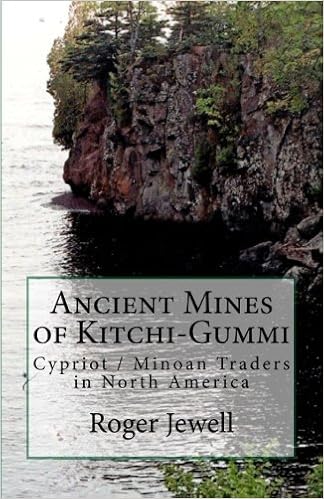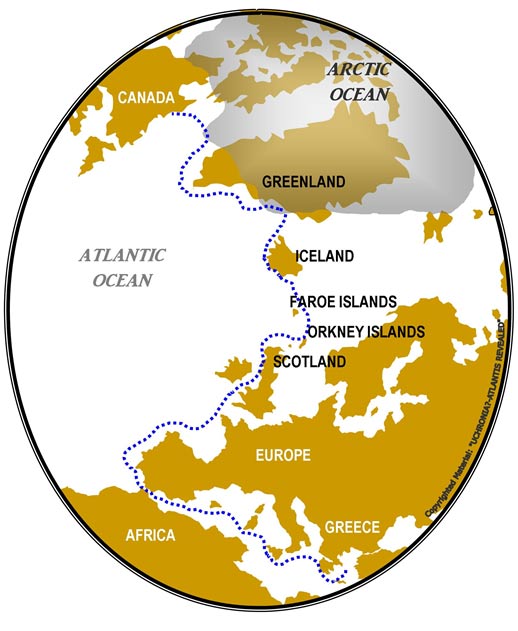2






















| Thumbs Up/Down |
| Received: 1,226/59 Given: 455/0 |


Are you trolling? The word wigwam is from an algonquian word, the ancestor of it is *wi-kiwa-ʔmi, the wi- is the definate possessed prefix. Another form from proto-Algonquian had the unposessed form *mi·kiwa·ʔmi, which has descendants in Cree, Cheyenne, and Algonquin (mîkowâhp; mâhëö'o; mîkïwâm)
Even if it has a Greek origin, by the time that Greeks would have technology to reach the Americas, the /w/ in Greek was already lost.
As for the Minoans; I can't find any sources for them being called any of those names. Kittim seems to be hebrew and referencing some people in Anatolia, probably the Hittites. I can't find any sources for Kyftu, Kyferu or Keferim that aren't a copy past of what you wrote posted by a Greek nationalist in a comments section or a forum, or by yourself on this forum.
I will give you this though, the name of Cyprus is almost definately derived from the Minoan language.








| Thumbs Up/Down |
| Received: 7/0 Given: 8/0 |














| Thumbs Up/Down |
| Received: 1,448/10 Given: 1,209/9 |


suspicious but that "cherokee" bish is cute














| Thumbs Up/Down |
| Received: 2,448/120 Given: 241/57 |


I just showed you that the root of Wigwam is *Wey-k- which is the root of all indo-European words meaning settlement and of the Greek word oikos which in proto-Greek was spelled with a w to give (w)oikos therefore oikos.
If the ancient Greek visited the Americas the first thing they would have done was build dwellings and those are the kind of things that you'd expect to survive and be incorporated in a foreign language and they have done.
From the cognates below it is clear that Wigwam is the accusative of (W)oikos or (W)oikon.
Author Gavin Menzies Is Determined to Prove That Minoans Discovered the New World 4,000 Years AgoPIE */wey-k-'settlement'
Glottalic *wey-kh-
*wey-kh- English '-wick, -wick, settlement' = Dwelling
http://www.utexas.edu/cola/depts/lrc...ettlement.html
NORTH EUROPEAN
Lithuanian viêsh-pat(i)s 'the Lord (God)',
vieshé.ti 'be a guest'
Old Prussian wais-pattin (accusative) 'lady of the
house'
Old Slavic visi 'village'
GERMANIC
Gothic weihs 'village'
Old High German wih 'village'
English -wick, -wich as in 'War-wick,
Sand-wich'
ANATOLIAN
Hittite
WEST EUROPEAN
Latin vi:cus 'village, settlement'
Old Irish
Tocharian
SOUTHEAST EUROPEAN
Greek (w)oîkos 'house', (w)oikeîn 'dwell'
Armenian
Sanskrit vísh- 'dwelling, tribe, clan', víshas
(plural) 'people',
véshas 'house', visháti
'settle'
Avestan vi:s- 'house, village, clan', vae:so
'house', vi:saiti 'enter'
Old Persian vith- 'house, village, clan'
https://www.wsj.com/articles/SB126593477531544685
Actual Minoan Linear A via 0726 La Canée musée linéaire A by Ursus – Own work. Licensed under Creative Commons Attribution-Share Alike 3.0 via Wikimedia Commons
Numerous findings seem to concede that the Minoans were keen navigators who crossed the Atlantic. They created colonies even in Canada and exploited local copper mines.
I recommend that you read this book:















| Thumbs Up/Down |
| Received: 2,448/120 Given: 241/57 |


Dimwit, the Minoans had a vast sea empire, a Thallasocracy, they absolutely dominated the seas. They explored the whole world. They reached as far as Yemen and India.
The Sangam epics of the Tamil spoke about “the magnificent ships of the Greeks bringing gold and leave laden with pepper…”.
In Herodotus time, there were Yemenis who claimed descend from Minoans!














| Thumbs Up/Down |
| Received: 2,448/120 Given: 241/57 |


Below are some pictures that prove the existance of the Greek civilization at the B.C. ages ,all over the America's region. These pictures have to do with the ancient civilizations of Incas, Maya, Toltecs, Olmecs, and all these cultures have the Greek influence inside them . Each thumbnail photo is a link to a larger version of the same photograph.
http://www.greek-thesaurus.gr/Ancien...s-America.html
Last edited by wvwvw; 04-30-2017 at 10:09 AM.














| Thumbs Up/Down |
| Received: 2,448/120 Given: 241/57 |


Dimwit, the Minoans had a vast sea empire, a Thallasocracy, they absolutely dominated the seas. They explored the whole world. They reached as far as Yemen and India.
The Sangam epics of the Tamil spoke about “the magnificent ships of the Greeks bringing gold and leave laden with pepper…”.
In Herodotus time, there were Yemenis who claimed descend from Minoans!
The copper mines of Cyprus as it is historically known could not even meet the requirements of the Pharaohs. Yet the Minoans gave them bronze saws doped with tin to cut the stone blocks of the …pyramids. As was written in the records of the Acadian king Skarga, the Minoan ships brought since 2350 BC tin from Spain and Britain.
And there's the finding of 1450 BC at the Akrotirion in Santorini. An excavation in the ancient city of Akrotiri, on the island of Santorini, revealed that a tobacco beetle (Lasioderma serricorne), an insect indigenous to America at the time, was found buried under the volcanic ash of the 1600 BC eruption. If tobacco was not introduced to Europeans until around 1518 AD, as history claims (nearly 3,000 years later), how else did this pest of stored tobacco got there.
If according to historians, the Bronze Age Minoans 4,000 years ago were often traveling as far as Scotland and the Orkney Islands to trade goods, it is not inconceivable to assume that over time (going back and forth for a thousand years) they may have eventually reached Greenland (the edge of Hyperborea,) only a couple of short island stops away. And, if those ancient navigators managed to reach Greenland via island hopping, it is entirely possible to assume that they could have gone a bit further and ultimately reached North America, which in essence, is just around the corner.















| Thumbs Up/Down |
| Received: 2,448/120 Given: 241/57 |


Greenland have even retained Greek toponyms like Icaria and Mykines. The Greeks had ancient colonies in Hyperborea which they retained even in Myceanean times. It seems that after the first Minoan merchants, the Mycenaeans continued the journey, and, as reported by Plutarch, they sent Hercules to revitalize the presence of the Greek element, which had been diminished by the continuous miscegenation with the locals. Later, during the Iron Age, the interest in the region declined and until the Hellenistic time, it remained only as a conventional ceremonial tradition. So every thirty years some ships were sent to the areas that followed the worship of Cronus in order to renew the priest personnel. - See more at: http://canada.greekreporter.com/2012....38Tvry0u.dpuf
CAVALESE, Italy—The year 1492 is one of history’s most famous dates, when America was discovered by Europeans. However that “New World” may have been already known to the ancient Greeks, according to a book by Italian physicist and philologist Lucio Russo.
Russo, who currently teaches probability at Tor Vergata University of Rome, says the main reason why researchers think America wasn’t known to ancient Greeks is not due to lack of proof, but to scientific dogma.
It is also untrue that science becomes better and better with time. There were, in fact, many instances of scientific and cultural decay, like the destruction of Carthage and the fall of Greek civilization, from which the Romans inherited only a small portion of their scientific knowledge.
Importantly, one of the skills they didn’t inherit was how to navigate the oceans.
You can get an idea of this by considering that “the size of the ships in the Hellenistic era was exceeded only in the era of Napoleon” and that Columbus based his trip on a partial recovery of Hellenistic math, according to the book. The Greeks were, among other things, at that time the only civilization that was able to understand that the Earth was round—an understanding that was later lost.
Even today we are in an epoch of “scientific crisis,” Russo told the Epoch Times. But it’s a crisis different from that of Roman times. The modern decay hides itself using technological advancements as a mask and consists in shrinking the availability of knowledge, now the property of a few people.
The Error of Ptolemy
So, how did people come to forget America, if it is true that it was already known to the ancients? The error, according to the author, is mainly due to Ptolemy, who developed a world map finding a midpoint between the claims made by various ancient sources.
The key problem is the identification of the Fortunate Islands, which the ancient Greeks sometimes referred to, as the Canary Islands (near the West coast of Africa). But the Greeks were actually referring to the Antilles, according to Russo. The misunderstanding was due to the Romans and other post-Greek people’s disbelief and incapability of navigating the oceans.
With philological and mathematical reasoning, Russo leads the reader to understand the meaning of all of Ptolemy’s errors—which are generally considered pretty huge—showing how the knowledge of the planet by ancient Greeks was instead very precise. Ptolemy missed the latitude of Canary Islands by 15 degrees latitude, making them to appear on the point of the map were the Antilles would expected to be. Of course America was not on his map.
Russo thinks we have “a lot to learn” from the ancient Greeks. For example we should “try to limit excessive specialization,” because the most interesting things can be understood only by those who have a grasp of more than one aspect of human knowledge.
http://www.theepochtimes.com/n3/2939...w.google.gr%2F
Last edited by wvwvw; 04-30-2017 at 10:03 AM.








| Thumbs Up/Down |
| Received: 7/0 Given: 8/0 |


















| Thumbs Up/Down |
| Received: 1,455/618 Given: 812/69 |


Dont be fooled the real cherokees are the basques/celts/true goths and by saying middle east they want you to think they were the imposters known as jews(crypto pharisees)today.If you believe these busted imposters you are unknowingly betraying your real ancestors
Much more info here. http://www.theapricity.com/forum/sho...hidden-history
There are currently 1 users browsing this thread. (0 members and 1 guests)
Bookmarks